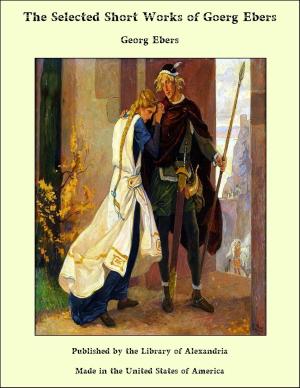The Return of The O'Mahony: A Novel
Nonfiction, Religion & Spirituality, New Age, History, Fiction & Literature| Author: | Harold Frederic | ISBN: | 9781465627506 |
| Publisher: | Library of Alexandria | Publication: | March 8, 2015 |
| Imprint: | Language: | English |
| Author: | Harold Frederic |
| ISBN: | 9781465627506 |
| Publisher: | Library of Alexandria |
| Publication: | March 8, 2015 |
| Imprint: | |
| Language: | English |
ZEKE TISDALE was the father of Company F. Not that this title had ever been formally conferred upon him, or even recognized in terms, but everybody understood about it. Sometimes Company F was for whole days together exceedingly proud of the relation—but alas! more often it viewed its parent with impatient levity, not to say contempt. In either case, it seemed all the same to Zeke. He was by no means the oldest man in the company, at least as appearances went. Some there were gathered about the camp-fire, this last night in March of ‘65, who looked almost old enough to be hisfather—gray, gaunt, stiff-jointed old fighters, whose hard service stretched back across four years of warfare to Lincoln’s first call for troops, and who laughed now grimly over the joke that they had come out to suppress the Rebellion within ninety days, and had the job still unfinished on their hands at the end of fourteen hundred. But Zeke, though his mud-colored hair and beard bore scarcely a trace of gray, and neither his placid, unwrinkled face nor his lithe, elastic form suggested age, somehow produced an impression of seniority upon all his comrades, young and old alike. He had been in the company from the beginning, for one thing; but that was not all. It was certain that he had been out in Utah at the time of Albert Sidney Johnston’s expedition—perhaps had fought under him. It seemed pretty well established that before this Mormon episode he had been with Walker in Nicaragua. Over the mellowing canteen he had given stray hints of even other campaigns which his skill had illumined and his valor adorned. Nobody ever felt quite sure how much of this was true—for Zeke had a child’s disregard for any mere veracity which might mar the immediate effects of his narratives—but enough passed undoubted to make him the veteran of the company. And that was not all. For cold-blooded intrepidity in battle, for calm, clear-headed rashness on the skirmish-line, Zeke had a fame extending beyond even his regiment and the division to which it belonged. Men in regiments from distant States, who met with no closer bond than that they all wore the badge of the same army corps, talked on occasion of the fellow in the —th New York, who had done this, that or the other dare-devil feat, and yet never got his shoulder-straps. It was when Company F men heard this talk that they were most proud of Zeke—proud sometimes even to the point of keeping silence about his failure to win promotion. But among themselves there was no secret about this failure. Once the experiment had been made of lifting Zeke to the grade of corporal—and the less said about its outcome the better. Still, the truth may as well be told. Brave as any lion, or whatever beast should best typify absolute fearlessness in the teeth of deadly peril, Zeke in times of even temporary peace left a deal to be desired. His personal habits, or better, perhaps, the absence of them, made even the roughest of his fellows unwilling to be his tent-mate. As they saw him lounging about the idle camp, he was shiftless, insubordinate, taciturn and unsociable when sober, wearisomely garrulous when drunk—the last man out of four-score whom the company liked to think of as its father. And Company F had had nothing to do, now, for a good while. Through the winter it had lain in its place on the great, steel-clad intrenched line which waited, jaws open, for the fall of Petersburg. The ready-made railroad from City Point was at its back, and food was plenty. But now, as spring came on—the wet, warm Virginian spring, with every meadow a swamp, every road a morass, every piece of bright-green woodland an impassable tangle—the strategy of the closing act in the dread drama sent Company F away to the South and West, into the desolate backwoods country where no roads existed, and no foraging, be it never so vigilant, promised food.
ZEKE TISDALE was the father of Company F. Not that this title had ever been formally conferred upon him, or even recognized in terms, but everybody understood about it. Sometimes Company F was for whole days together exceedingly proud of the relation—but alas! more often it viewed its parent with impatient levity, not to say contempt. In either case, it seemed all the same to Zeke. He was by no means the oldest man in the company, at least as appearances went. Some there were gathered about the camp-fire, this last night in March of ‘65, who looked almost old enough to be hisfather—gray, gaunt, stiff-jointed old fighters, whose hard service stretched back across four years of warfare to Lincoln’s first call for troops, and who laughed now grimly over the joke that they had come out to suppress the Rebellion within ninety days, and had the job still unfinished on their hands at the end of fourteen hundred. But Zeke, though his mud-colored hair and beard bore scarcely a trace of gray, and neither his placid, unwrinkled face nor his lithe, elastic form suggested age, somehow produced an impression of seniority upon all his comrades, young and old alike. He had been in the company from the beginning, for one thing; but that was not all. It was certain that he had been out in Utah at the time of Albert Sidney Johnston’s expedition—perhaps had fought under him. It seemed pretty well established that before this Mormon episode he had been with Walker in Nicaragua. Over the mellowing canteen he had given stray hints of even other campaigns which his skill had illumined and his valor adorned. Nobody ever felt quite sure how much of this was true—for Zeke had a child’s disregard for any mere veracity which might mar the immediate effects of his narratives—but enough passed undoubted to make him the veteran of the company. And that was not all. For cold-blooded intrepidity in battle, for calm, clear-headed rashness on the skirmish-line, Zeke had a fame extending beyond even his regiment and the division to which it belonged. Men in regiments from distant States, who met with no closer bond than that they all wore the badge of the same army corps, talked on occasion of the fellow in the —th New York, who had done this, that or the other dare-devil feat, and yet never got his shoulder-straps. It was when Company F men heard this talk that they were most proud of Zeke—proud sometimes even to the point of keeping silence about his failure to win promotion. But among themselves there was no secret about this failure. Once the experiment had been made of lifting Zeke to the grade of corporal—and the less said about its outcome the better. Still, the truth may as well be told. Brave as any lion, or whatever beast should best typify absolute fearlessness in the teeth of deadly peril, Zeke in times of even temporary peace left a deal to be desired. His personal habits, or better, perhaps, the absence of them, made even the roughest of his fellows unwilling to be his tent-mate. As they saw him lounging about the idle camp, he was shiftless, insubordinate, taciturn and unsociable when sober, wearisomely garrulous when drunk—the last man out of four-score whom the company liked to think of as its father. And Company F had had nothing to do, now, for a good while. Through the winter it had lain in its place on the great, steel-clad intrenched line which waited, jaws open, for the fall of Petersburg. The ready-made railroad from City Point was at its back, and food was plenty. But now, as spring came on—the wet, warm Virginian spring, with every meadow a swamp, every road a morass, every piece of bright-green woodland an impassable tangle—the strategy of the closing act in the dread drama sent Company F away to the South and West, into the desolate backwoods country where no roads existed, and no foraging, be it never so vigilant, promised food.















